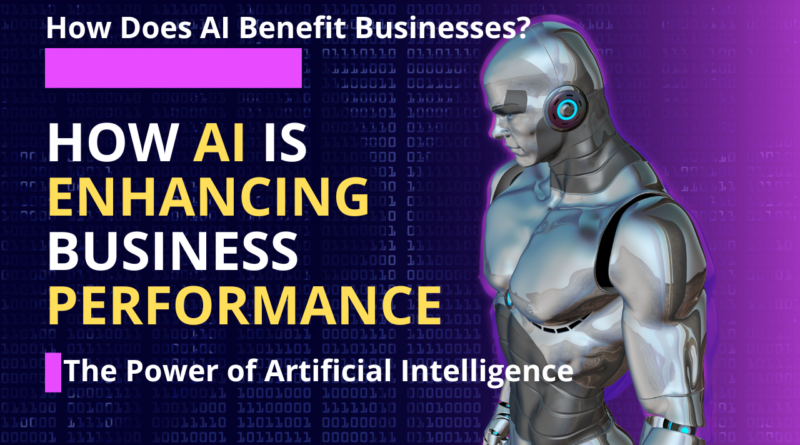Power of Artificial Intelligence: How Does AI Benefit Businesses
Artificial Intelligence
Artificial intelligence, commonly referred to as AI, has revolutionized business operations since it can replicate human intelligence. AI provides businesses with a competitive edge by automating tedious processes or providing solutions faster. AI’s positive impacts can be found everywhere from automation and productivity gains, enhanced decision-making processes and customer experience enhancement to enhanced decision-making processes – this article details many advantages AI offers business operations.
Understanding the benefits of AI for businesses
AI-Powered Automation and Productivity Enhancements
Artificial intelligence can offer businesses significant time and resource savings through automating routine, repetitive tasks. By taking advantage of machine learning and natural language processing, companies can streamline operations for increased efficiencies; AI chatbots may handle customer inquiries instantly while providing real-time customer support, reducing human intervention and increasing customer satisfaction.
AI can boost productivity beyond automation by spotting patterns and trends that human analysts might miss. AI Analyzing vast amounts of data at lightning speed, these AI algorithms can uncover valuable insights for businesses looking to make more informed decisions.
Improved speed of business
Staying ahead in today’s fast-paced business environment requires swift action, and AI can assist businesses by speeding up and optimizing processes more effectively. AI algorithms can analyze market trends and customer behavior quickly, allowing companies to adapt strategies and offerings in real-time in response to changes and customer demands more effectively – providing businesses with an invaluable competitive advantage in meeting them more quickly than their rivals.
AI technology facilitates the automation of tasks that would otherwise take more time and effort to complete manually, such as processing large volumes of data automatically for analysis and decision-making purposes, speeding up decision-making time considerably while helping businesses become more proactive and agile by seizing opportunities faster and meeting challenges more efficiently.
Increased Monitoring
AI technologies play a pivotal role in monitoring and overseeing business operations. By analyzing real-time data from sensors and IoT devices, AI algorithms can analyze real-time information to detect anomalies or patterns that indicate potential issues; for instance, in manufacturing, AI-powered systems can monitor equipment performance while anticipating maintenance needs to reduce downtime and boost productivity.
AI can enhance cybersecurity monitoring.
Given the growing sophistication of cyber attacks, businesses require practical tools to detect and respond quickly to potential breaches. AI-powered cybersecurity systems can monitor network traffic for suspicious patterns to enable proactive protection measures against any possible attacks or potential data loss.
Increased profitability
At the core of every business lies its desire for maximum profitability, and AI can play an invaluable role in this effort. By automating processes, cutting costs, and increasing efficiency, AI can have a lasting effect on a company’s bottom line; for example, AI-powered supply chain management systems can optimize inventory levels while decreasing wasteful spending and transportation expenses, resulting in greater profitability for companies using them.
AI can assist businesses in discovering new revenue streams and opportunities. By analyzing customer data and anticipating trends, AI algorithms can offer insightful information into customer preferences and behaviors, using this knowledge to develop targeted marketing campaigns, personalized recommendations, and tailored product offerings to increase sales growth and drive revenues upward.
AI Can Reduce Human Error
Human error is an inherent risk in any business, but AI can mitigate this risk by improving the quality and accuracy of processes. AI-powered systems can perform tasks more precisely and consistently than human operators, eliminating variation and errors due to human involvement. For instance, in healthcare, AI algorithms can aid doctors with diagnosing diseases quickly while simultaneously interpreting medical images, thus decreasing misdiagnoses and improving patient outcomes.
AI can also boost quality control processes by rapidly detecting defects and anomalies in real-time, while in manufacturing, AI-powered systems can analyze product data to see deviations from quality standards quickly, allowing businesses to take corrective actions accordingly.
Enhancing decision-making through AI algorithms
Today’s business environment demands accurate and strategic decisions from decision-makers. AI algorithms offer businesses valuable insights and recommendations that empower decision-makers to make more precise and strategic choices by analyzing vast amounts of data from multiple sources – they identify patterns, trends, and correlations that might otherwise remain hidden from humans.How does ai benefit businesses
Artificial Intelligence-powered predictive analytics enable businesses to anticipate market demand accurately, optimizing production and inventory levels accordingly. Meanwhile, AI algorithms can also analyze customer data to detect upsell/cross-sell opportunities that allow businesses to tailor offerings and increase revenues.
AI can simulate and model various scenarios, providing businesses with an opportunity to assess the potential outcomes of multiple decisions before implementing them. AI’s predictive capability helps minimize risks and uncertainties so companies can make more confident and booming decisions.
AI-Driven Customer Experience and Customization
AI has revolutionized how businesses interact with customers, providing customized experiences tailored to individual customer needs and preferences. Companies leveraging these cutting-edge technologies can leverage them for customer engagement that provides truly tailored experiences that satisfy particular demands and preferences.
Artificial intelligence in marketing and sales
AI has revolutionized customer targeting and engagement. AI algorithms can analyze customer data to identify patterns and predict buying behaviors, enabling businesses to deliver targeted and personalized campaigns. AI-powered recommendation engines may provide personalized product or service suggestions based on a customer’s browsing and purchase history to increase conversion chances and customer retention.
AI-powered chatbots and virtual assistants offer real-time customer assistance, improving their experience and satisfaction. These AI agents understand natural language to provide accurate responses in real-time, making interactions between customers more efficient and personalized.
AI for Data Analysis and Insights
Data analysis is essential in business decision-making, and AI can significantly augment this process. Leveraging AI algorithms, businesses can analyze large volumes of data from various sources to uncover insights that drive strategic decisions. AI-powered data analytics tools enable businesses to make data-driven decisions more confidently.
AI can streamline data collection, cleaning, and preparation tasks, allowing businesses to focus on interpreting insights instead of manually processing tasks.
AI in cybersecurity and risk management
In our increasingly digital world, cybersecurity threats pose an enormous risk to businesses. AI technology can be critical in detecting and mitigating such threats to protect business data and systems.
AI-powered cybersecurity systems can sift through vast network traffic to identify patterns that indicate potential attacks or vulnerabilities. By constantly monitoring network activity and analyzing real-time data, AI algorithms can recognize anomalies or suspicious activity on networks, allowing businesses to take proactive steps against cyber attacks.
AI can improve risk management processes by analyzing data from various sources and predicting potential risks and vulnerabilities. By early identification of risks, businesses can take measures to minimize them and protect their assets.
Challenges and considerations of implementing AI in businesses
Implementing AI Technologies
While AI offers great potential benefits for businesses, there are also challenges and considerations related to implementation that must be considered before moving forward with any implementation efforts. Examples of such obstacles could be:
Data Privacy and Security
AI relies heavily on large volumes of data, so protecting it effectively is paramount for businesses using AI technologies. Businesses must devise stringent data protection strategies by relevant regulations to safeguard customer and company records.
Ethics Concerns
Artificial intelligence algorithms make decisions based on patterns and data, yet can also perpetuate biases and inequalities. Businesses should ensure their AI systems are designed and trained ethically to promote fairness and inclusiveness.
Implementing AI technologies requires highly trained professionals with specific AI expertise who can create, deploy, and maintain systems effectively. Businesses should invest in training or hiring talent with these requisite AI capabilities to ensure successful implementation.
Integration with existing systems
Integrating AI technologies with existing systems and processes is often complex and challenging for businesses and should be carefully planned to ensure seamless operation and minimal disruption.
Future trends of AI for businesses
AI technology is rapidly progressing, and several promising trends are shaping its business future. Some of these trends include:
Explainable AI
As AI algorithms become increasingly complex and advanced, their use demands greater transparency and explainability. Explainable AI’s mission is to increase understanding and interpretability of AI algorithms and decision-making processes – helping bridge the divide between human decision-makers and AI decision-makers.
Edge AI
Edge AI refers to the deployment of artificial intelligence algorithms and models directly on edge devices, such as smartphones or IoT devices, for real-time processing and analysis of data with reduced latency for faster decision-making processes.
This trend allows for real-time data processing with enhanced real-time analysis capabilities for improved efficiency in decision-making processes.
AI and Augmented Analytics
Augmented analytics merges AI technologies with traditional tools to enhance data analysis and decision-making processes. AI algorithms can automate data preparation, generate insights, and make recommendations while expanding human data analysis capacities.
AI and Natural Language Processing
NLP allows computers to understand and respond to human speech. Combining NLP with AI technologies can create revolutionary business-customer interactions by offering tailored and conversational experiences.
Conclusion: Harnessing AI for Business Success
Artificial intelligence’s influence and benefits on businesses cannot be understated. From automation and productivity gains to enhanced decision-making capabilities and customer experience improvements, AI can revolutionize how companies operate in today’s digital environment.
Implementing AI technologies comes with its own set of hurdles and considerations for businesses, with issues related to data privacy, ethics, talent acquisition, and integration needs to be considered for its successful deployment. Businesses that embrace these challenges and stay current on future trends can harness AI’s full potential and enjoy sustainable growth and success.
AI continues to change the face of business, and organizations must embrace it as it offers them a powerful competitive edge. Leveraging its power can open new opportunities, streamline processes, and provide exceptional customer experiences – now is the time for businesses to embrace this transformative technology!
FAQ’S
Q1: How Can Artificial Intelligence Benefit Small Businesses?
Q2: What are the potential risks of AI for businesses?
Data privacy and security concerns.
Ethical considerations.
The potential displacement of human workers.
Therefore, they need to address these threats and develop strategies accordingly.





Pingback: 20+ BEST AI BUSINESS IDEAS - Lobster Techs
Pingback: How to Find the Cheapest Shipping for Your Small Business - Lobster Techs
Pingback: Top Eco-Friendly Gadgets for a Green Lifestyle - Lobster Techs